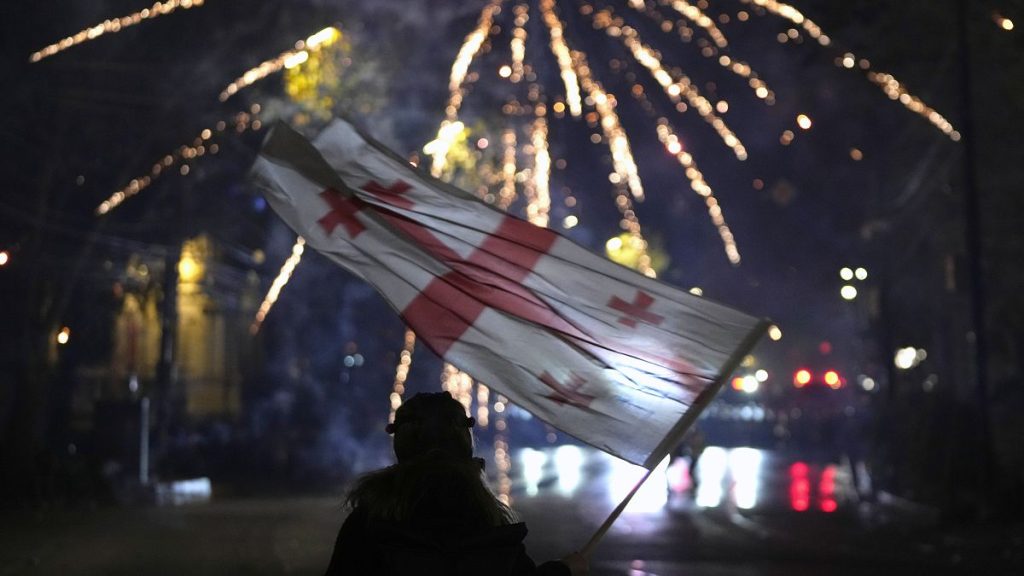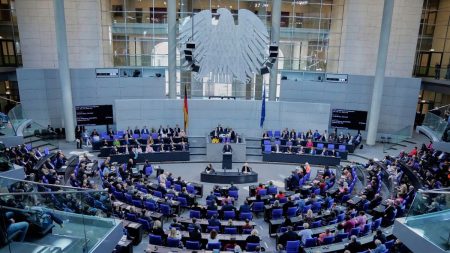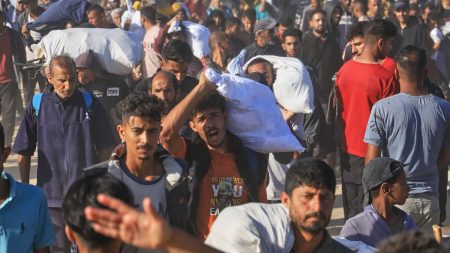The streets of Georgia have been ablaze with protests for nine consecutive nights, ignited by the government’s decision to suspend negotiations for joining the European Union. This move has been met with widespread public outrage, transforming what began as demonstrations against disputed parliamentary election results into a broader outcry against perceived authoritarianism and a perceived betrayal of the nation’s European aspirations. The protests, centered in the capital Tbilisi but spreading across the country, have been marked by a significant escalation in tension, with police employing increasingly forceful tactics to quell the dissent. The use of water cannons, tear gas, and alleged instances of excessive force have resulted in hundreds of detentions and numerous injuries, further inflaming the situation and drawing condemnation from international observers and Georgia’s pro-EU President, Salome Zourabichvili.
The underlying tensions stem from the October 26 parliamentary elections, in which the ruling Georgian Dream party retained control amidst allegations of rigging and manipulation. The opposition, accusing the government of collaborating with neighboring Russia to maintain power, contends that the election was neither free nor fair. International observers echoed these concerns, reporting instances of violence, bribery, and irregularities at the polls. The European Parliament, in a resolution criticizing the election and highlighting Georgia’s democratic backsliding, further fueled public discontent. The Georgian Dream party’s subsequent decision to shelve EU accession talks until at least 2028 was the catalyst that sparked the current wave of protests. This decision was ostensibly a response to the European Parliament’s criticism, but it has been interpreted by many protesters as a deliberate move away from the EU and towards closer alignment with Russia.
The protesters, diverse in their backgrounds but united in their pro-European stance, see the government’s actions as a direct affront to the Georgian constitution, which mandates support for European integration. They view the escalating police crackdown as reminiscent of tactics employed by the Russian regime, deepening their resolve to resist what they perceive as an authoritarian slide. Protesters argue that the government’s use of force is disproportionate and violates fundamental human rights, reinforcing their demands for new elections under fair and transparent conditions. The injuries sustained by protesters, including a 22-year-old who was reportedly placed in an induced coma after being struck by a tear gas canister, have further galvanized the demonstrators and intensified international scrutiny of the government’s response.
The protests represent a critical juncture in Georgia’s political trajectory. The government’s decision to suspend EU accession talks has not only ignited public fury but also highlighted the deep divisions within Georgian society regarding the country’s future direction. The protesters’ demands encompass not only new elections but also a broader rejection of the perceived authoritarian tendencies of the ruling party. Their resilience in the face of increasing police pressure underscores their determination to uphold democratic values and pursue closer ties with Europe. The government’s response to these protests, and the international community’s reaction, will significantly shape Georgia’s political landscape in the coming months and years.
The Georgian Dream party, while maintaining its grip on power, faces mounting pressure both domestically and internationally. The accusations of election manipulation, the controversial ‘foreign influence’ law passed earlier this year, and the recent crackdown on protests have all drawn criticism from international bodies and raised concerns about the erosion of democratic freedoms in Georgia. The party’s perceived alignment with Russia, particularly in light of the ongoing conflict in Ukraine, further complicates its position and adds another layer of complexity to the protests. The government’s narrative, which frames the protests as being orchestrated by opposition forces and external actors seeking to destabilize the country, has failed to quell the unrest and has instead further alienated segments of the population.
The future of Georgia hangs in the balance. The outcome of the current protests will determine whether the country continues down a path towards greater authoritarianism or reaffirms its commitment to democratic principles and European integration. The international community’s role in mediating the crisis and supporting Georgia’s democratic institutions will be crucial. The protesters’ unwavering determination, despite the risks they face, serves as a testament to the enduring desire for a democratic and European future for Georgia. The government’s response to their demands will be a defining moment for the country’s future.










